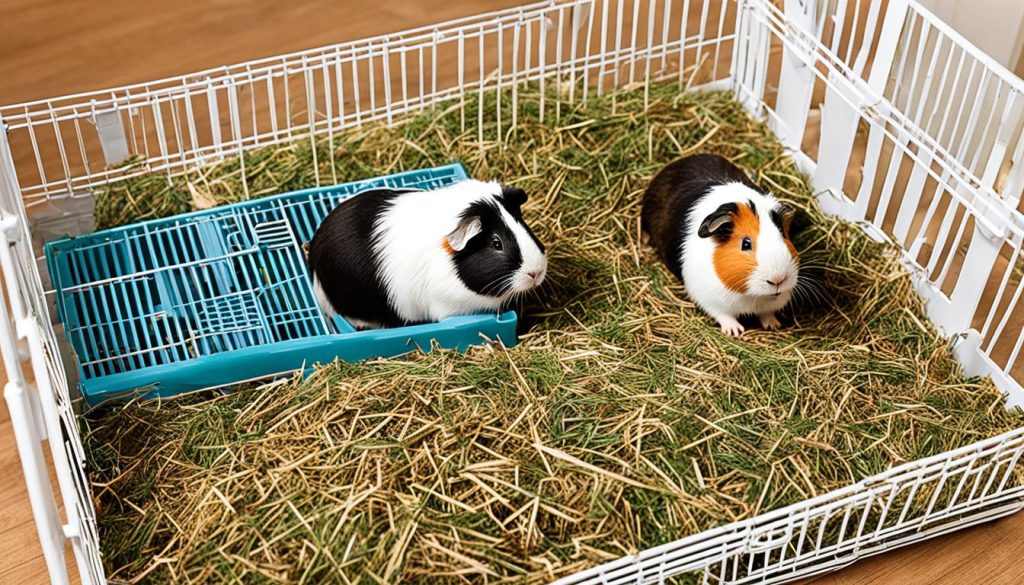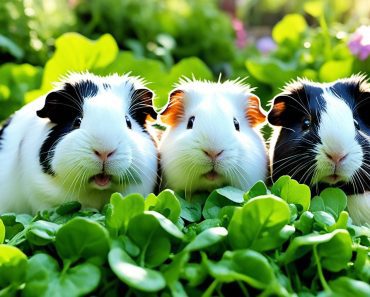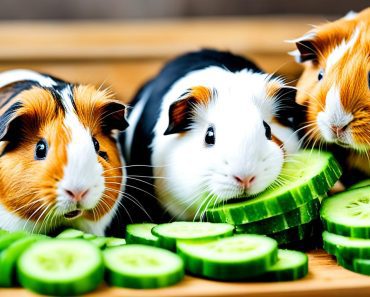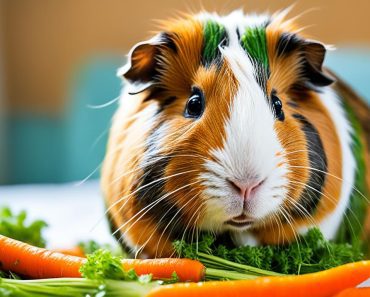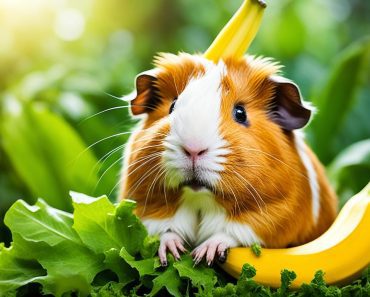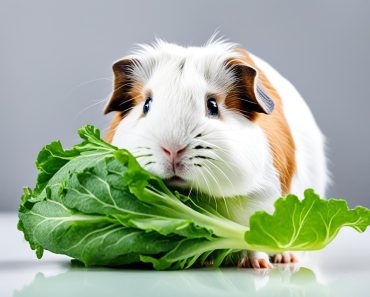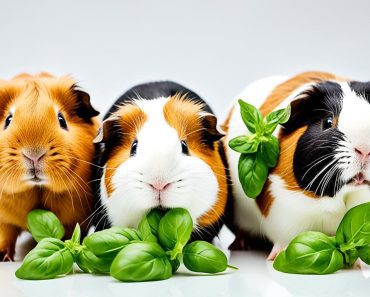Hi there! If you’re a guinea pig owner, you know how important it is to provide a proper diet for your furry friends. But what about onions? Can guinea pigs eat onions? Let’s find out!
Onions, along with vegetables like leeks and garlic, are best avoided when it comes to feeding guinea pigs. These vegetables contain a compound called thiosulfate, which can be harmful to guinea pigs if consumed in large quantities. Eating onions can lead to digestive issues, including upset stomach and diarrhea. To keep your guinea pig healthy and happy, it’s best to stay away from onions in their diet.
Can Guinea Pigs Eat Onions? Yes, but it is not recommended.
- Onions, along with leeks and garlic, contain thiosulfate and should not be fed to guinea pigs.
- Feeding onions to guinea pigs can cause digestive issues and upset stomach.
- It’s important to provide a safe and appropriate diet for guinea pigs to ensure their health and well-being.
- Stick to guinea pig-friendly vegetables like cabbage, lettuce, carrots, and broccoli for a balanced diet.
- Consult with a veterinarian specializing in exotic animals for specific dietary recommendations for your guinea pig.
Guinea Pig Diet: What Do Guinea Pigs Eat?
As herbivores, guinea pigs have specific dietary requirements. Providing a balanced and nutritious diet is essential for their overall health and well-being. Here is a breakdown of what guinea pigs can eat:
Grass Hay and Timothy Hay-Based Pellets
High-quality grass hay, such as timothy or orchard hay, should be the foundation of a guinea pig’s diet. It helps promote proper digestion and keeps their teeth healthy. Timothy hay-based pellets without added seeds or colored pieces can also be included.
Fresh Green Vegetables
Guinea pigs can enjoy a variety of fresh green vegetables daily. These can include cabbage, lettuce, carrots, broccoli, and celery. These veggies provide essential vitamins and minerals necessary for their well-being.
Vitamin C-Rich Foods
Guinea pigs cannot synthesize their own vitamin C, so it’s vital to include foods rich in this nutrient in their diet. Some excellent options include bell peppers, parsley, kale, and citrus fruits like oranges and strawberries.
Avoid Toxic Foods
It’s crucial to avoid feeding guinea pigs certain foods that can be toxic to them. These include potatoes, onions, rhubarb leaves, and oxalis clover. These foods can cause digestive issues and other health problems.
| Foods Guinea Pigs Can Eat | Foods Guinea Pigs Should Avoid |
|---|---|
|
|
Remember to introduce new foods gradually, monitor their eating habits, and consult with a veterinarian for personalized dietary recommendations.
Guinea pigs thrive on a diet rich in fresh green vegetables and hay. Providing them with the right nutrition ensures their well-being and happiness.
Guinea Pig Health: Common Issues and Care Tips
Proper care and regular veterinary check-ups are crucial for maintaining the health of guinea pigs. As a responsible guinea pig owner, I understand the importance of providing my furry friends with the best care possible. To ensure their well-being, I pay close attention to their dental health, hygiene, grooming needs, and overall nutrition.
Dental Health
Guinea pigs, like humans, have teeth that continuously grow throughout their lives. To prevent dental problems, it’s essential to provide them with enough chewable material to wear down their teeth.
By offering high-quality grass hay, such as timothy or orchard hay, I ensure that my guinea pigs have adequate dental wear. Chew toys made specifically for guinea pigs can also provide an extra source of chewing and entertainment.
Hygiene and Hutch Maintenance
To keep my guinea pigs healthy, I maintain a clean and hygienic living environment.
“Cleanliness is essential for the well-being of guinea pigs.”
Regular cleaning and disinfecting of their hutch help prevent pest infestations and maintain their hygiene. By using pet-safe cleaning products and removing any waste or soiled bedding, I create a safe and comfortable living space for my guinea pigs.
Grooming
Regular grooming is necessary, especially for long-haired guinea pigs.
To prevent matting and discomfort, I gently brush their fur using a soft brush or a small animal comb. This not only helps maintain their coat’s health but also strengthens the bond between us.
Hold Them with Care
Proper handling is crucial for the safety and well-being of guinea pigs.
When picking them up, I make sure to support their body using both hands and hold them close to my chest. This minimizes the risk of injury and keeps them feeling secure. By providing them with a calm and gentle environment, I help reduce stress and build trust.
Veterinary Care
Regular veterinary check-ups play a vital role in the overall health of guinea pigs.
I consult a veterinarian who specializes in exotic animals to address any health concerns and obtain professional advice on nutrition, mite prevention, and other important aspects of guinea pig care.
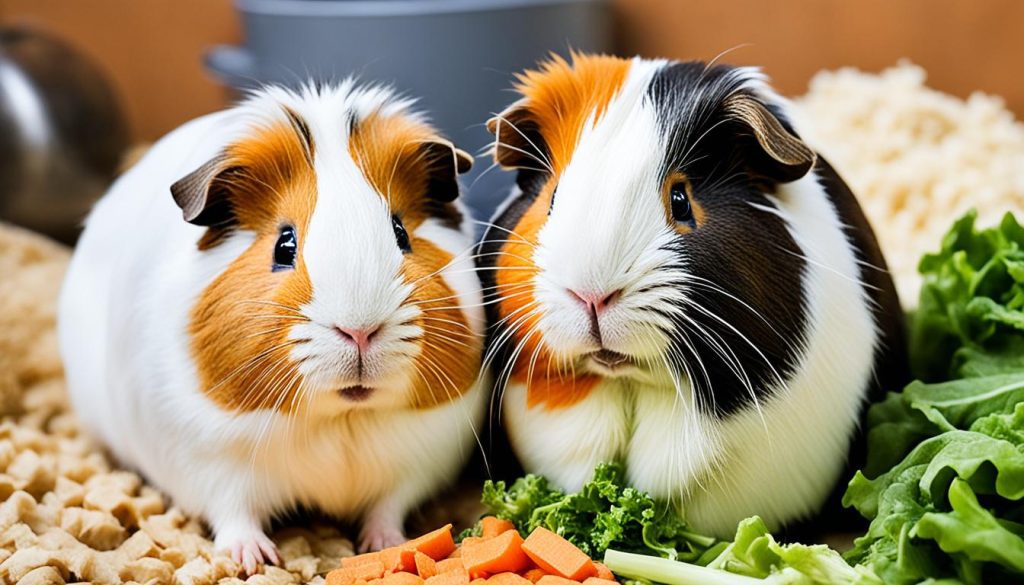
| Common Health Issues | Care Tips |
|---|---|
| Dental problems | Provide chewable material like grass hay and chew toys |
| Mite infestations | Clean and disinfect the guinea pig’s hutch regularly |
| Long-haired guinea pigs | Groom regularly to prevent matting |
| Safe handling | Pick them up with two hands and hold them close to the chest |
| Regular vet check-ups | Consult a veterinarian specializing in exotic animals |
Safe Treats for Guinea Pigs
In addition to their regular diet, guinea pigs can enjoy some treats in moderation. It’s important to provide variety in their diet to keep them engaged and satisfied. Here are some safe options for guinea pig treats:
Vegetables:
- Lettuces: Green leaf, red leaf, romaine, and Bibb lettuce.
- Bell Peppers: Green, red, and yellow bell peppers.
- Cilantro: Fresh cilantro leaves.
- Carrots: Carrots and carrot tops.
- Zucchini: Fresh zucchini slices.
- Collards and Kale: These leafy greens can be offered in small amounts.
- Fennel: Fresh fennel can add a unique flavor to their diet.
Fruits:
- Tomatoes: Fresh and ripe tomatoes.
- Berries: Blackberries, strawberries, and raspberries.
- Bananas: Ripe bananas (in moderation due to their high sugar content).
Remember to offer treats in small portions and avoid exceeding more than one cup per day. It’s important to maintain a balanced diet for your guinea pig’s overall nutrition and health.
“Guinea pigs, like humans, enjoy a variety of foods. Treats can be a great way to bond with your furry friend.”
Housing and Care Tips for Guinea Pigs
Guinea pigs require proper housing and care to ensure their well-being and happiness. Here are some essential tips for providing a suitable environment for your furry friends:
Hutch and Protection:
A guinea pig’s hutch should offer protection from predators and extreme weather conditions. Ensure that the hutch is well-ventilated to maintain a healthy environment for your guinea pigs.
Rest and Exercise Areas:
The hutch should have separate areas for your guinea pigs to rest and exercise. This allows them to have a comfortable space to relax and an area to stay active. Providing appropriate hiding spots and tunnels can also enrich their living space.
Bedding Materials:
Choose suitable bedding materials for the hutch, such as wood shavings, cellulose fiber, shredded paper, or polar fleece. These materials provide comfort and help absorb moisture and odor.
The importance of regular cleaning:
Clean the hutch regularly to prevent respiratory infections, skin ailments, and pest infestations. Proper hygiene is essential to maintain your guinea pigs’ health and well-being.
Temperature and Comfort:
Guinea pigs are sensitive to temperature changes. Avoid placing the hutch in direct sunlight or exposing them to extreme heat. Provide a warm and comfortable environment for your guinea pigs by ensuring adequate insulation and airflow.
Adequate Water Supply:
Guinea pigs require fresh, clean water at all times. Make sure to provide them with a suitable water dispenser or a heavy, tip-proof bowl that they can easily access.
| Aspect | Tips |
|---|---|
| Protection | Ensure the hutch provides protection from predators and extreme weather. |
| Rest and Exercise | Offer separate areas for resting and exercise. |
| Bedding | Use suitable bedding materials like wood shavings or shredded paper. |
| Cleaning | Clean the hutch regularly to prevent health issues and infestations. |
| Temperature | Maintain a warm and comfortable environment for your guinea pigs. |
| Water Supply | Ensure fresh, clean water is readily available. |
By following these housing and care tips, you can create a safe and comfortable home for your guinea pigs. Providing a suitable environment is essential to their overall health and well-being.
Social Needs and Companionship for Guinea Pigs
Guinea pigs are social animals and thrive in the company of their own kind. It is recommended to keep at least two guinea pigs together to ensure they have companionship. Males should be introduced at a young age to prevent aggression. It’s important to provide enough space and appropriate housing to accommodate multiple guinea pigs. Avoid housing guinea pigs with rabbits, as rabbits can be aggressive towards guinea pigs. Ensuring their social needs are met will contribute to their overall well-being and happiness.
The Benefits of Companionship
Guinea pigs are highly sociable creatures and form strong bonds with their fellow guinea pigs. They rely on social interaction for mental stimulation, companionship, and communication. When guinea pigs have a companion, they engage in various social behaviors such as grooming each other, playing, and vocalizing. These interactions help reduce stress and loneliness, leading to happier and healthier guinea pigs.
Introducing Guinea Pigs
When introducing new guinea pigs, it’s essential to take a gradual approach. Start by allowing the guinea pigs to see and smell each other through a barrier, such as a mesh or cage bars. This helps them get acquainted without direct contact. Once they become familiar with each other’s scents, you can proceed to supervised face-to-face interactions in a neutral territory. Watch for any signs of aggression or stress and be prepared to separate them if necessary.
Housing for Multiple Guinea Pigs
Providing adequate housing for multiple guinea pigs is crucial for their well-being. The size of the hutch or enclosure should be spacious enough to accommodate all guinea pigs comfortably. Ensure that there are separate hiding spots, feeding areas, and enough space for exercise. Additionally, choose bedding materials that are safe and easy to clean, such as wood shavings or polar fleece.
Tip: Guinea pigs love to explore and play, so consider adding tunnels, hideouts, and toys to keep them entertained.
Monitoring Social Dynamics
While guinea pigs generally enjoy the company of others, it’s important to monitor their social dynamics. Some guinea pigs may exhibit dominance behaviors, especially during feeding time or when establishing territorial boundaries. Keep an eye out for any signs of aggression, such as biting, mounting, or excessive chasing. If you notice any harmful behaviors, it might be necessary to provide additional resources or separate the guinea pigs temporarily for their safety.
By ensuring that guinea pigs have companionship and suitable housing, you can promote their social well-being and overall happiness. Remember to introduce new guinea pigs gradually and monitor their interactions closely. Providing a nurturing environment for their social needs is an essential part of guinea pig care.
Conclusion
Providing a balanced and nutritious diet, proper housing, regular veterinary care, and social interaction are crucial for the overall well-being of guinea pigs. By following these guidelines, you can ensure that your furry friends live a healthy and happy life.
To maintain a guinea pig’s health, it is important to avoid feeding them toxic foods such as onions. Instead, focus on providing a diet rich in fresh green vegetables, such as cabbage, lettuce, and carrots. Make sure to include high-quality grass hay, like timothy or orchard hay, and vitamin C-rich foods as well.
Along with a proper diet, attending to their grooming needs is essential. Regularly clean and disinfect their living environment to prevent respiratory infections and maintain their hygiene. Additionally, make sure they have adequate companionship as guinea pigs are social animals and thrive in the company of their own kind.
Remember, guinea pigs rely on us for their care and well-being. By taking the necessary steps to provide them with a safe, nutritious diet, a comfortable living environment, regular veterinary check-ups, and social interaction, you can ensure that your guinea pigs lead a happy and healthy life by your side.

